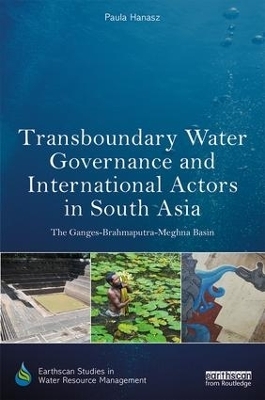
Transboundary Water Governance and International Actors in South Asia
Routledge (Verlag)
978-1-138-09754-4 (ISBN)
International organisations such as the World Bank began to intervene in the transboundary water governance of the Ganges-Brahmaputra-Meghna river basin in the mid-2000s, and the South Asia Water Initiative (SAWI) is its most ambitious project in this regard. Yet neither SAWI nor other international initiatives, such as those of the Australian and UK governments, have been able to significantly improve transboundary water interaction between India, Nepal, Bhutan and Bangladesh.
This book identifies factors that contribute to water conflicts and that detract from water cooperation in this region. It sheds light on how international organisations affect these transboundary water interactions. The book discusses how donor-led initiatives can better engage with transboundary hydropolitics to increase cooperation and decrease conflict over shared freshwater resources. It is shown that there are several challenges: addressing transboundary water issues is not a top priority for the riparian states; there is concern about India’s hydro-hegemony and China's influence; and international actors in general do not have substantial support of the local elites. However, the book suggests some ways forward for improving transboundary water interaction. These include: addressing the political context and historical grievances; building trust and reducing power asymmetry between riparian states; creating political will for cooperation; de-securitising water; taking a problemshed view; strengthening water sharing institutions; and moving beyond narratives of water scarcity and supply-side solutions.
Paula Hanasz has completed a PhD at the Australian National University, Australia. She consults on issues of defence, national security and non-traditional security threats.
Introduction 1. International actors in the resolution of transboundary water conflicts 2. Legacies and challenges for water governance in the Ganges-Brahmaputra problemshed 3.The transboundary water governance agenda in the Ganges-Brahmaputra problemshed 4. Why are international actors interested in the Ganges-Brahmaputra problemshed? 5. Normative claims of international actors 6. From water conflict to water cooperation through the World Bank? 7. Mixed reactions to foreign-led initiatives from riparian stakeholders 8. Obstacles to positive water interaction in the Ganges-Brahmaputra problemshed 9. The small issue of the big brother; the effect of India’s hydro-hegemony 10. Limitations of foreign-led approaches 11. Structural challenges in the global system of foreign aid 12. Insights for international actors in the Ganges-Brahmaputra problemshed and beyond 13. Conclusions
| Erscheinungsdatum | 21.10.2017 |
|---|---|
| Reihe/Serie | Earthscan Studies in Water Resource Management |
| Zusatzinfo | 1 Halftones, black and white; 1 Illustrations, black and white |
| Verlagsort | London |
| Sprache | englisch |
| Maße | 156 x 234 mm |
| Gewicht | 453 g |
| Themenwelt | Naturwissenschaften ► Biologie ► Ökologie / Naturschutz |
| Naturwissenschaften ► Geowissenschaften ► Geografie / Kartografie | |
| Sozialwissenschaften ► Politik / Verwaltung ► Allgemeines / Lexika | |
| Sozialwissenschaften ► Politik / Verwaltung ► Europäische / Internationale Politik | |
| Technik ► Umwelttechnik / Biotechnologie | |
| ISBN-10 | 1-138-09754-3 / 1138097543 |
| ISBN-13 | 978-1-138-09754-4 / 9781138097544 |
| Zustand | Neuware |
| Haben Sie eine Frage zum Produkt? |
aus dem Bereich


